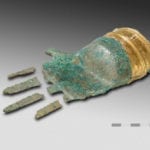 Mysteries
Mysteries  Mysteries
Mysteries  History
History 10 Surprising Stories About the Texas Rangers
 Humans
Humans 10 Philosophers Who Were Driven Mad by Their Own Theories
 Miscellaneous
Miscellaneous 10 Video-Game-Worthy Weapons and Armors from History
 Weird Stuff
Weird Stuff 10 Psychics Who Accurately Predicted Wartime Events
 The Arts
The Arts 10 Pieces of Art Inspired by a Broken Heart
 Health
Health 10 Science Fiction-Sounding New Medical Treatments
 History
History 10 Surprising Facts About the Father of Submarine Warfare
 Space
Space Ten Astonishing New Insights into Alien Worlds
 Weird Stuff
Weird Stuff 10 Bizarre Summer Solstice Rituals Still Practiced Today
 Mysteries
Mysteries Top 10 Haunting Facts About the Ghost Ship MV Alta
 History
History 10 Surprising Stories About the Texas Rangers
 Humans
Humans 10 Philosophers Who Were Driven Mad by Their Own Theories
Who's Behind Listverse?

Jamie Frater
Head Editor
Jamie founded Listverse due to an insatiable desire to share fascinating, obscure, and bizarre facts. He has been a guest speaker on numerous national radio and television stations and is a five time published author.
More About Us Miscellaneous
Miscellaneous 10 Video-Game-Worthy Weapons and Armors from History
 Weird Stuff
Weird Stuff 10 Psychics Who Accurately Predicted Wartime Events
 The Arts
The Arts 10 Pieces of Art Inspired by a Broken Heart
 Health
Health 10 Science Fiction-Sounding New Medical Treatments
 History
History 10 Surprising Facts About the Father of Submarine Warfare
 Space
Space Ten Astonishing New Insights into Alien Worlds
 Weird Stuff
Weird Stuff 10 Bizarre Summer Solstice Rituals Still Practiced Today
10 Unusual Motorways From Your Wildest Dreams
Most people drive on normal highways every day. However, there are amazing, wildly constructed, and imaginative roads around the world with crazy stories to tell.
10 The Highway That Sings
We all know one of the major reasons for motor crashes is speeding. However, the New Mexico Department of Transportation (NMDOT) curbs the speeding trend along Route 66 with a very creative trick. Route 66 in New Mexico plays the tune of “America the Beautiful” whenever someone drives over it. The highway itself is the musical instrument.
The patriotic tune can only be heard when drivers drive over the rumble strips on the right side of the highway at the speed of 72 kilometers per hour (45 mph). This is meant to act as a form of speed control, rewarding the driver with music if they do not speed. The feature was not added only for the entertainment—driving over the rumble strips prevents the drivers from falling asleep, another major cause of car accidents. The NMDOT also believes that by slowing down to enjoy the tune, motorists can enjoy the view of the state.
The construction was paid for by the National Geographic Channel as part of their show Crowd Control, which conducts experiments to understand more about human behavior.
9 The Highway With A House In The Middle
Most of us can only imagine what it’s like to live in the middle of a highway, but 67-year-old Luo Baogen of China and his 65-year-old wife actually did. Trouble started when the Chinese government wanted to construct a highway leading to a new railway station. They paid all the occupants of Xiazhangyang to vacate the neighborhood, but Baogen and his wife rejected the compensation because the money was not enough for them to build a new house.
The Chinese government went ahead and built a highway around the house. The five-story house stood in the middle of a four-lane highway. Chinese laws prevents the government from demolishing people’s houses forcefully, leading to many “nail houses.”
The building was later demolished after Luo Baogen and his wife choose to accept the compensation of 260,000 yuan ($41,000). Baogen didn’t want the attention from the media his bizarre living arrangement was causing.
8 The Highway Through A Runway
A major problem with the British territory of Gibraltar is the lack of flat land. This often results in rather inconvenient routes. The Gibraltar Airport runway runs straight through the Winston Churchill Avenue Highway. The highway is the busiest in the peninsula because it is the only road connecting Gibraltar to Spain, and it runs through Gibraltar’s only airport. Whenever an airplane has to land or depart, the gates and barriers on the road are shut, putting all traffic at a standstill. Any pedestrian on the runway is also expected to get out of the way of the aircraft.
This overlap is dangerous for both the motorists and planes. There are stern warnings around the airport warning pedestrians and motorists that dropping litter can hinder the safety of the people on the plane.
Fortunately, the airport is not a busy one, handling only about 30 flights a week. There are also plans to reroute the road so that it passes under the runway instead. Recent plans by the Gibraltar government to construct a tunnel will prevent the traffic obstructions, delays, and danger on the highway.
7 The Road With The Highest Speed Limit
If you find the average speed limit on your highway unexciting or slow, then the High Speed Test Track at Holloman Air Force Base (HSTTH) was constructed with you in mind. At the HSTTH, the average speed is 10 times the speed of sound. There’s a sign along the track that reads “Mach 10“—if you break this speed limit, you’re likely to be celebrated rather than issued a ticket.
Constructed in the late 1940s and early ’50s, the road is not intended for leisurely drives in the car; it was designed for high-speed tests. This road has aided innovations in parachute, seat belt, and nuclear technologies. The record for highest speed reached by a man on this track is held by John P. Stapp, who went at the speed of 1,017 kilometers per hour (632 mph) on the Sonic Wind Rocket Sled 1. The closest anyone has gotten to breaking the posted speed limit was mach 8.5 with another rocket sled.
6 The Atlantic Ocean Road
Atlanterhavsveien, or the Atlantic Ocean Road, is an 8.3-kilometer (5.2 mi) road located in the western part of the Norwegian coastline. The road comprises bridges, causeways, viaducts, and viewpoints for tourists. The road was originally intended to be a bridge before that plan was abandoned. Construction of the road began in 1983, and it took six years for it to be completed. Within that time period, the construction of the road was interrupted by 12 hurricanes. Twelve million Norwegian krone ($1.5 million) was spent on the development before the road was open for use on July 7, 1989.
The Atlantic Ocean Road is considered a national tourist route and acknowledged as the “Norwegian construction of the century.” It’s scenic view has made it popular among motorists and cyclists. It even has special landings along some of its eight bridges for fishermen.
5 The Tallest Bridge In The World
The Millau Viaduct, completed in 2004, is the tallest bridge in the world. Called the “marvel of art and architecture” by French president Jacques Chirac, the bridge was designed by British architect Lord Norman Foster and French engineer Michel Virlogeux. It’s 343 meters (1,125 ft) tall and 2,460 meters (8,070 ft) long. It was constructed to ease the traffic flow of motorists en route from Paris to Barcelona. The construction of the bridge took three years.
Construction of the road cost approximately €400 million ($440 million). The construction was privately financed by Eiffage, the same firm responsible for the Eiffel Tower. In return, they are expected to collect tolls until 2080—or as soon as 2044 if the bridge is highly profitable. The bridge is the tallest structure in France, slightly taller than the prestigious Eiffel Tower. On a cloudy day, the bridge sometimes gives the illusion that it is floating in the clouds.
4 The Extraterrestrial Highway
Nevada State Highway 375, popularly called the “Extraterrestrial Highway,” is a 158-kilometer (98 mi) road through the deserts of the American Southwest. The highway got its name from the numerous claims of UFO sightings by motorists who frequent the road. Adding to the credibility of the motorists’ claims is the mysterious Area 51, which is located along the highway.
Claims of UFO sighting on the route started in the 1980s, but people only began taking those claims seriously when Bob Lazar, an engineer, stated on television that he worked on an alien spaceship in Area 51 in 1989. Lazar’s television appearance led to lots of people touring the road to satisfy their curiosity. Seeing the tourism potential of their road, the state officially christened it the “Extraterrestrial Highway” in a ceremony witnessed by the lead actors of the movie Independence and some Fox studio executives.
The UFO sightings do have rational explanations. The highway also runs alongside the Nellis Air Force Base, where numerous secret aircrafts and missiles have been tested since 1950.
3 The Highway Without Vehicles
M-185 on Mackinac Island, Michigan, is the only carless highway in the country. The 13.4-kilometer (8.3 mi) road is usually only traveled by foot, horse, carriage, and bicycle as a result of an island-wide ban on automobiles. The ban was proposed in the early 1890s when tourists brought cars onto the island and disrupted the peace and quiet with all the traffic. Furious residents wanted nothing to do with the automobile, one resident reportedly calling it a “mechanical monster.” The ban was agreed upon in 1898, and the “horseless carriages” haven’t been allowed on the island since.
One small exception to the ban was made for the film Somewhere In Time, directed by Jeannot Szwarc. While cars were allowed on the island during the shoot, the actors and production team were not allowed to drive them—except while they were shooting.
After the advent of electric bikes, the island also rejected those because they might scare their horses and cause accidents on the highway. One of the very few vehicles allowed by the island is a police Jeep that assists the elderly during winter. During winter, snowmobiles may be used to move from one place to another. Children on the island can get a license for their snowmobiles at the age of 12.
Once in a while, there are small accidents on the highway. These accidents are mostly caused by tourists who choose to bike while intoxicated.
2 The Underwater Motorway
Named among the “seven wonders of the modern engineering world,” the Chesapeake Bay Bridge-Tunnel is a wonder to behold. The 37-kilometer (23 mi) road comprises four artificial islands and two high-level steel bridges, but that’s not what makes this motorway so special. The motorway, which was considered dangerous at first, dips below the water into two 1.6-kilometer (1 mi) tunnels.
The Chesapeake Bay Bridge-Tunnel was first envisioned in 1956 and strongly supported by Chesapeake Bay Ferry Commission chairman Lucius J. Kellam Jr. It cost almost $200 million to build. The United States Navy quickly pointed out the obvious obstacle the bridge would present to them—it would prevent their Atlantic fleets from reaching the ocean. To settle the matter with the Navy, the two tunnels were proposed. One of them can be seen at 9:00 in the video above, and the other at 14:15.
Certain vehicles are sometimes excluded from the Chesapeake Bay Bridge-Tunnel on certain days because it is prone to extreme storms and wind gusts. This occurs about 15–20 times per year. The wind can be so strong that it can blow cars overboard.
1 The Highest Highway
The Karakoran Highway, which is about 5,000 meters (16,000 ft) high, is the highest paved international road on Earth. The 1,300-kilometer (800 mi) highway was constructed to connect Pakistan to China through the Karakoran mountain range by the Pakistani government in collaboration with the Chinese government. The construction of the road began in the late ’60s, and the road was open for use in 1986. The highway was intended to make it easier for China to access Gwadar Port in Pakistan. The construction of the road was so dangerous that it claimed a life for every mile.
After construction, the highway remained dangerous. Motorists who traverse this road have been subjected to terrorist attacks in the past. Sometimes, the road is closed due to frequent landslides, some of which can cover an entire village. Some motorists have also been known to encounter snow leopards on the way to their destination.








